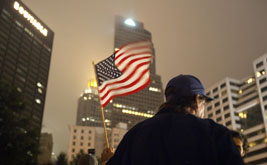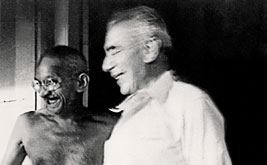Mm-mm Good!
Fairfield, Iowa
I cannot thank you enough for your outstanding coverage of the global food movement [Oct. 3]. Here in Iowa, we are surrounded by industrialized agribusiness-as-usual and its seeming stranglehold on the state economy and our legislative processes. And yet we are also gifted with Practical Farmers of Iowa, Seed Savers Exchange, Jeffrey Smith and his leading-edge campaign for labeling foods containing GMOs, a fast-growing number of farmers’ markets, CSAs, food co-ops and grassroots organizations advocating “buy fresh, buy local.” There’s a lot of work to be done, but there are also many reasons for hope, which your world-class authors cited.
PATRICK BOSOLD
Just Deserts
New York City
Eric Alterman made a rare writing gaffe when he wrote of Keynes’s theories, “Data-wise, the proof has been in the pudding” [“The Liberal Media,” Sept. 19]. The correct aphorism is, “The proof of the pudding is in the eating”—i.e., if you want to know how well a pudding or anything else stands up, test it. “The proof is in the pudding” makes no sense unless you are in the habit of hiding economic figures or other evidence in your dessert or side dish. That’s not how my mom made kugel.
ROBERTA GOLD
Alterman Replies
New York City
This really takes the cake…
ERIC ALTERMAN
Occupying Wall Street
Audubon, N.J.
Citizens gather in Liberty Plaza in New York City to protest the greed and corruption of Wall Street and its corrosive effects on our nation’s economy and well-being. We witness the spectacle of police guarding the bronze bull statue on Wall Street—a sight almost biblical in its significance. The powers that be order their enforcers, the police, to guard the Golden Calf in front of the Temple of Greed, where the elites worship their great gods: money, power, greed, envy and lust. It is easy to envision the rituals in the Temple of Greed: with hands in the air, the high priests and their followers chant, “More, more, more.” But more is never enough.
RUDY AVIZIUS
CartooNation!
Ray City, Ga.
I’m a liberal to the bone. That’s why I like your great magazine. But I can’t get into the look. The magazine is very, very plain. Lots of copy, small print. A guy my age finds it hard to read it. Also, there’s almost no photos! And where are the cartoons? People, those tea-baggers can make up ten pages of laffs.
I’m a newspaper and magazine man from way back. Trust me when I say The Nation needs help, big time. Make it stand out, make it colorful. When someone picks it up, it should jump out at ‘em. If a magazine don’t grab you, you won’t read it. And worse, you won’t subscribe. I was about to, but I just could not get over how dull it looked. If you change the look, I sure will buy it—and so will others. Excelsior!
CLIFF ULMER
We hope Mr. Ulmer has reconsidered after taking a gander at our “Arab Awakening” issue, the food issue (pictured above) and after seeing last week’s cover. —The Editors
What Rhymes With ‘Schnackenberg’?
Lewiston, Me.
On awakening and picking from a bedside bookshelf, I happened to find my copy of Heavenly Questions by Gjertrud Schnackenberg. Later that day, I was surprised and gratified to open The Nation to Susan Stewart’s excellent review of that book and three other fine volumes of elegies by American women [“Discandied,” Sept. 12]. Were the average voter so in tune with politics and the written arts as is The Nation, we might have a democracy worthy of the name. A quibble: did I hear some damning with faint praise in Stewart’s typification of Schnackenberg’s pentameter lines? “Unabated,” “relentless,” “startlingly graceful,” “nearly invisible” and “historically, scientifically and emotionally literate” might be more appropriate characterizations. Of course, you cannot convince me (and I’ve tried my damnedest to read them all) that Schnackenberg is not quite simply the greatest poet working in English today, and her expert handling of meter is at the heart of her talent. It should also be mentioned that she burst onto the scene (as much as any poet can “burst” onto such a widely neglected stage) with Laughing With One Eye in 1977, a superb small book of formal elegies about her father, Walter, a history professor. Collected with others as Portraits and Elegies in 1982, these poems are the summit of this genre in our literature. It seems that, sadly for her and impressively for the rest of us, no one in America has a better grip on what it means to be mortal than Gjertrud Schnackenberg.
If Americans knew and regarded Schnackenberg (or even the comprehensively incisive Stewart, for that matter) with the same fervor and interest as they do, say, Kim Kardashian, this would be a culture and a country much more worth the saving. As it is, blind materialism, with its hostility to poetry, intellection, pure scientific inquiry and transcendence in any form, is destroying civilization, and the biosphere. Every emperor keeps fiddling, nonetheless—and who anymore can recite a favorite poem by heart? Hell, when’s The Nation’s swimsuit issue?
MICHAEL T. CORRIGAN Read More
Our Readers and Eric Alterman











